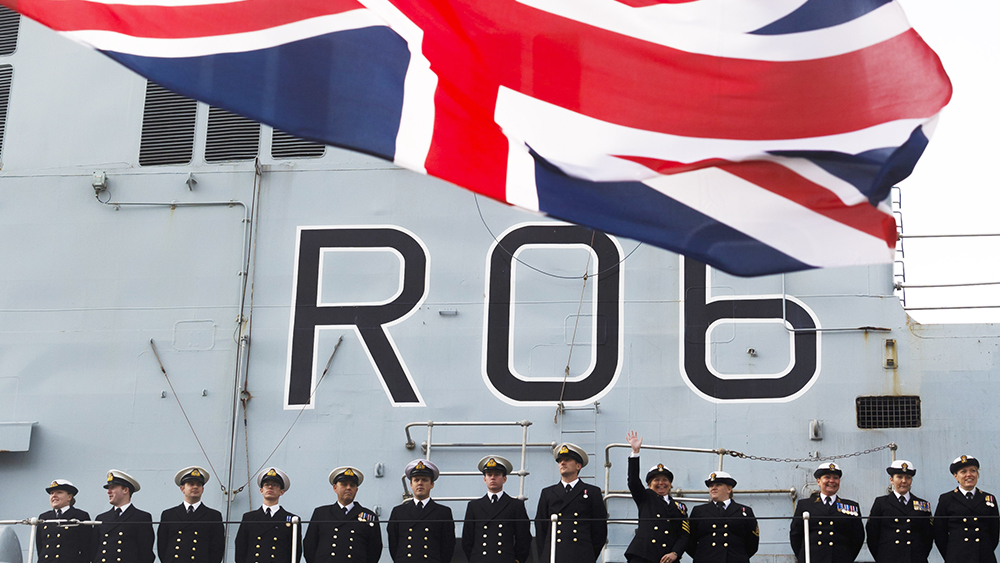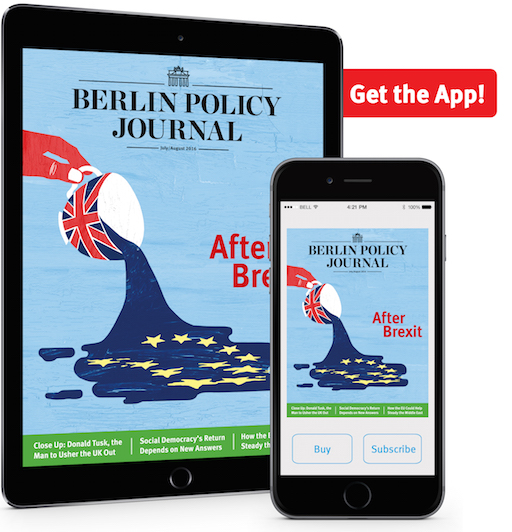While the political and economic implication of Brexit will probably take years to unravel, the one area where London could “keep calm and carry on” is British foreign and security policy, at least up to a point.
Foreign policy received little play in the run-up to the Brexit vote. The final televised pre-referendum debate between three leading representatives from the Remain and Leave campaigns was supposed to discuss “Britain’s place in the world” as one of three main topics. Yet this was barely touched upon. There was no substantive discussion on the EU as a potential force for influence and power projection, whether in the face of the challenge from Russia, the tragedy of Syria, the arrival of China as a key strategic actor, or even the importance of pan-European cooperation on issues of cybersecurity and counter-terrorism. When foreign policy did manage to creep into the debate, it was mostly to discuss the fantastical – the establishment of a European Army or a forthcoming Turkish accession to the EU.
But given that the issues surrounding the constitutional, political, and economic makeup of the United Kingdom will likely take several years to play out, the one area where Britain will be able to “keep calm and carry on” in the short- to medium-term will be on issues of foreign and security policy.
While some Leave campaign supporters might see the world otherwise, the intellectual architects of Brexit who are likely to dominate in the next government, are open, outward-looking, liberal free-traders, who will seek a common cause with their European and transatlantic partners in the protection of a stable, liberal, international world order. Indeed, in his first article published following the Brexit decision, Boris Johnson, the leading face of the Leave campaign who then withdrew his bid to become the next prime minister, reminded readers, “I cannot stress too much that Britain is part of Europe and always will be.”
To put it another way, and in the Latin language of which Johnson is famously so fond of, “Omnia mutantur, nihil interit” – “Everything changes, nothing perishes” (Ovid, Metamorphoses).
The UK in Europe
So what does this mean in practice for a post-Brexit UK foreign and security policy? Starting with France and what The Economist once labeled the UK’s “impossible, indispensable relationship,” the British government is likely to re-emphasize its commitments to Anglo-French defense cooperation under the 2010 Lancaster House treaties, although it will have to recognize the inevitable imperative for France to increase its defense cooperation with Germany in particular.
The UK is also likely to push itself, once more, to find concrete opportunities for cooperation with a Germany whose influence has long been growing inside the EU and whose appetite for engagement in issues of defense and security policy appears to be increasing steadily. Meanwhile, defense industrial cooperation and the cross-border complexities of supply chains will continue to help bind the UK to its partners on the continent. For example, while the wings of most Airbus aircraft are designed and produced in Wales, the British, French, and German governments will have common cause in ensuring that work on Airbus’s order backlog of €1 trillion continues uninterrupted and its 136,000-strong workforce protected. The same logic applies to the partnerships that have been developed around the multinational venture that is Eurofighter and the search for fresh export sales of its Typhoon.
While the UK will continue to view NATO as the bedrock of European security, it will also likely look to underline the importance of working with its European partners through continued, albeit re-fashioned, engagement in the EU’s Common and Security Policy. After all, the list of non-EU partner countries on CSDP missions includes not just aspirant member states but many others who are clearly not, from Norway to Canada to South Korea. However, with Brexit completed the UK will no longer sit on the EU Council of Ministers, but will rather be allowed access only to the “decision-shaping” Committee of Contributors. There are then, perhaps, some issues with the existing parameters for participation against which the UK might feel obliged to push back in return for the added credibility and operational utility it would perceive its participation as contributing. Yet even as it makes these proactive and positive approaches, the UK will continue to fret about the perils of any duplication of NATO efforts and worry (too late) about its lack of a voice to influence future developments.
The UK in NATO
Paris has been developing a more activist foreign policy toward the crises of the day recently, while London’s engagement on these issues has often been less than impressive. However, British enthusiasm for NATO is likely to remain ingrained in the thinking of any post-Brexit UK. Indeed, the political pressures for the UK to protect and project continued strategic relevance are likely to be such that, even allowing for the economic pressures expected to result from Brexit, the UK should signal its continued serious intent by maintaining defense spending at two percent of its GDP.
The UK can be expected to make much of its service as the lead nation in the alliance’s Very High Readiness Joint Task Force next year. More immediately, it appears set to take a key role within NATO’s new Enhanced Forward Presence, if, as appears likely, the UK is announced at the forthcoming NATO summit in Warsaw as the lead nation of one of the four battalions set to be deployed on NATO’s eastern frontline. The ongoing work to try once again to find ways to promote greater cooperation between the EU and NATO now becomes of even more fundamental importance. Meanwhile, though, the tone of the summit will inevitably need to be adjusted in the wake of Brexit, with more emphasis given to unity within NATO than would previously have been necessary.
The World Beyond
A UK untethered from the EU will still remain supportive of EU efforts to manage troublemakers in their shared neighborhoods. For example, the UK has consistently argued in favor of a rollover of Russian sanctions while Russia’s obligations under the Minsk II agreement remain unfulfilled. If compromises are to be made in the future on this or other questions pertaining to support for a rules-based international order, it is unlikely that the momentum for this will come from the UK, whether it is in or out of the EU.
Indeed, if Vladimir Putin is rubbing his hands with glee at Brexit, as many commentators are imagining, then it is more to do with the potential consequences of Brexit for the EU’s positioning on this issue than it is to do with the UK’s. Similarly, an “E3” (rather than “EU3”) that ultimately proved to have significant impact in its negotiations with Iran does not necessarily have to depend on British EU membership when it comes to the management of future challenges.
Moving further, it would be reasonable to expect the UK to pay even more attention in the coming years to its relationships in Asia. Despite some criticism from its European and transatlantic partners, the UK has been investing heavily in a significant commercial partnership with China. To UK thinking, this is supposedly balanced by an increasingly substantive defense partnership with Japan that includes cooperation on equipment design, such as the Joint New Air-to-Air Missile (JNAAM), as well as negotiations on reciprocal access. Since 2014, a UK liaison officer has been colocated with the US Seventh Fleet to work closely with the Japanese Self-Defense Forces, helping to propel some of the cooperation now unfolding, including the likely deployment of Typhoon fighter jets to exercise with Japan later this year. As UK Defense Secretary Michael Fallon noted at this year’s IISS Shangri-La Dialogue, by the 2020s the UK is set to have two aircraft carriers ready to sail the seas of the Asia-Pacific region. Brexit will change the financing and even the timings, but it is unlikely to change the ambition and could conceivably even bolster it.
Although all European member states arguably are guilty, to greater or lesser degrees, of having an Asia policy that has often amounted to little more than a China policy, the UK’s so-called “all of Asia policy” has progressed further than many. This already includes renewed interest in the Five Powers Defense Arrangement that the UK enjoys with Commonwealth members Australia, New Zealand, Malaysia, and Singapore, and the placement of ambassadors or high commissioners in all ten ASEAN capitals as well as to ASEAN itself. It also covers relationships developed through the “2+2” mechanism with Japan that combines foreign and defense Ministers, as well as the corresponding mechanism with Australia known as AUKMIN. In as much as the political bandwidth of a government preoccupied by Brexit talks allows, all of this is likely to rise up the UK’s strategic agenda in the years ahead.
One criticism of the EU made by the Leave campaign focused on the EU’s ineptitude in concluding free trade agreements. There is likely therefore to be considerable economic and strategic interest, once Brexit takes effect, in the relatively speedy negotiation of free trade agreements with countries such as South Korea and Singapore – and more tricky, but of course of tremendous potential significance – some sort of deal with India and even China. While some reasonably note that the terms for the UK may not be so favorable as those achievable as part of a market of 500 million, Brexiteers will be quick to point out that the chances of actually reaching any such deals have increased considerably, with responsibility for any failures here reverting back into sovereign hands.
A Weakened Home Environment
There should be no hiding from the scale of the difficulties and dangers that lie ahead. It is well established that all successful foreign policies begin at home, yet the home environment for the UK in the coming years will be dangerously distracted as well as worryingly weakened.
Nevertheless, through these turbulent times, the UK will seek to remind its partners in Europe and elsewhere of all of the available avenues through which it can continue to engage in the promotion of shared liberal values. These include not just its permanent seat on the UN Security Council but also, for example, its membership in the G7, now liberated from the limitations of Russian membership. Ultimately the choice for the new UK government will not be whether to partner closely with Europe, including the EU, but how.
More than fifty years have passed since Dean Acheson, then already a former US secretary of state, suggested that “Britain has lost an empire and not yet found a role.” With its vote for Brexit, it appears that the search continues. Yet, the price for this search is paid not just by the UK. Indeed, the strategic consequences of Brexit are arguably less severe for the UK than they are for the EU.
Europe now has to grapple with the challenge of keeping its unprecedented union together, whilst working out what sort of union it wants to deliver and its peoples to see. Simultaneously, Europe should aspire to find ways to harness the UK as a productive, close partner in support of the common values and interests which the EU and the UK will undoubtedly continue to share, with the intention that the whole remains greater than the sum of its parts, even when those parts reside outside of the union. This will be demanding but doable. The pitfalls ahead will be plentiful though, and all parties will need to tread carefully in the emotions and frustrations of the weeks, months, and likely years ahead.
Read more in the Berlin Policy Journal App – July/August 2016 issue.








